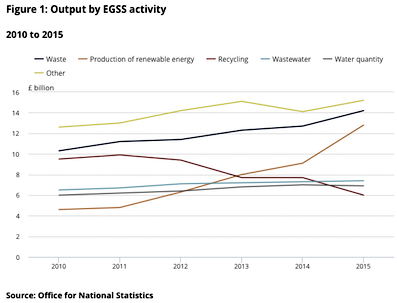 Cleanzine: your weekly cleaning and hygiene industry newsletter 26th June 2025 Issue no. 1168
Cleanzine: your weekly cleaning and hygiene industry newsletter 26th June 2025 Issue no. 1168
Your industry news - first
The original and best - for over 20 years!
We strongly recommend viewing Cleanzine full size in your web browser. Click our masthead above to visit our website version.
Waste management 'biggest contributor' to UK environmental goods and services sector
 The Office for National Statistics' newly-released statistical bulletin on the UK environmental goods and services sector - (EGSS): 2010 to 2015 - has revealed that the waste management sector is the largest contributor to EGSS.
The Office for National Statistics' newly-released statistical bulletin on the UK environmental goods and services sector - (EGSS): 2010 to 2015 - has revealed that the waste management sector is the largest contributor to EGSS.
It has also revealed that the renewable energy contribution to EGSS continues to grow while the recycling contribution is declining, and that the majority of EGSS exports are from waste management and recycling.
The EGSS contributed £62.5 billion of output to the UK economy in 2015, growing 27% between 2010 and 2015 (without adjusting for inflation). It contributed £30.5 billion to the economy in terms of gross value added in 2015, growing by 23% since 2010 and continuing to represent around 1.6% of UK gross domestic product.
The sector contributed around 335,000 full-time equivalent jobs to the economy in 2015; an increase of 10% from 2010 to 2015 and representing around 1% of total UK employment.
Waste management accounted for the single largest proportion of total EGSS output (23%) and employment (30%) in 2015.
Between 2010 and 2015, the output and GVA from production of renewable energy activities nearly trebled, from £4.6 billion to £12.8 billion and £2.3 billion to £6.2 billion respectively.
The production of renewable energy accounted for 4% of total EGSS employment but around 20% of total EGSS output and GVA in 2015.
The sector is made up of areas of the economy engaged in producing goods and services for environmental protection purposes, as well as those engaged in conserving and maintaining natural resources. Excluded are goods and services produced for purposes that, while beneficial to the environment, primarily satisfy technical, human and economic needs or that are requirements for health & safety.
Environmental protection activities include technologies, goods and services that reduce or prevent the amount of harmful material that enters the environment, while resource management activities include technologies, goods and services that manage or conserve natural resources. Both classifications also include activities related to monitoring the quality of the environment, research and development, general administration, and training and teaching related to environmental protection or resource management.
24th May 2018







